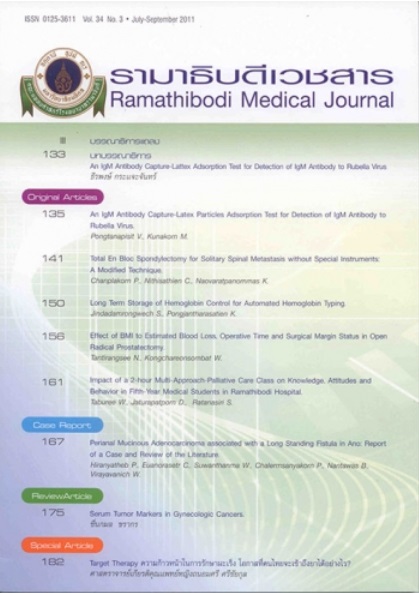Impact of a 2-hour Multi-Approach-Palliative Care Class on Knowledge, Attitudes and Behavior in Fifth-Year Medical Students in Ramathibodi Hospital
Main Article Content
Abstract
Background: Medical student have traditionally received no education in palliative care. However, in 2002, as part of a revised medical curriculum, Year 5 undergraduates at Ramathibodi Hospital, Mahidol University, Bangkok, Thailand participated in a 2-hour class in palliative care.
Purpose: The aim of this study was to assess the effect of the education programme from the pre and post self-evaluation form in perceived interest, knowledge, attitude and skills.
Methods: 35 medical students (100%) completed the pre and post self-evaluation form. Stuat Maxwell Analysis was performed to test statistic significance of the improvement.
Results: After the 2-hour class, all students (100%) rate that the highest scale for their interest in palliative care, compared to 62.5% prior to the class. For knowledge, it showed that approximately 80% rated themselves up to average level prior to the class, while 97% rated themselves to be improved to high and highest level after the class. Attitudes toward palliative care tended to be improved by increasing the number of people who rated ‘highest’ for attitude domain from 5.71% to 74.29%. As for the confidence to
Conclusion: This 2-hour lecture has significantly raised 5th year medical students’ understanding of palliative medicine in many domains including interest, knowledge, attitude and skills.
Article Details
References
Nagaviroj K, Jaturapatporn D. Cancer pain--progress and ongoing issues in Thailand. Pain Res Manag. 2009;14(5):361-2.
Jaturapatporn D, Kirshen AJ. Attitudes towards truth-telling about cancer: a survey from Thailand. Palliat Med. 2008;22(1):97-8. doi:10.1177/0269216307085179.
Globalization and Medical Education. 11th Thai Medical Education Meeting. https://161.200.98.10/unit/meded11/meded11/index.php?option=comcontent&task=blogcategory&id=18&Itemid=26. Accessed May 20, 2010.
Shapiro MC, Shapiro RA, Ubolcholket S. Medical education in Thailand. Med Educ. 1992;26(3):251-8. doi:10.1111/j.1365-2923.1992.tb00162.x.
Mason SR, Ellershaw JE. Undergraduate training in palliative medicine: is more necessarily better? Palliat Med. 2010;24(3):306-9. doi:10.1177/0269216309351867.
Thomson O'Brien MA, Freemantle N, Oxman AD, Wolf F, Davis DA, Herrin J. Continuing education meetings and workshops: effects on professional practice and health care outcomes. Cochrane Database Syst Rev. 2001;(2):CD003030. doi:10.1002/14651858.CD003030.
Kirkpatrick DL. Evaluating Training Programs: The Four Levels. 2nd ed. San Francisco, CA: Berrett-Koehler; 1998.
Mason S, Ellershaw J. Assessing undergraduate palliative care education: validity and reliability of two scales examining perceived efficacy and outcome expectancies in palliative care. Med Educ. 2004;38(10):1103-10. doi:10.1111/j.1365-2929.2004.01960.x.
Ostgathe C, Voltz R, Nauck F, Klaschik E. Undergraduate training in palliative medicine in Germany: what effect does a curriculum without compulsory palliative care have on medical students' knowledge, skills and attitudes? Palliat Med. 2007;21(2):155-6. doi:10.1177/0269216306075543.
Mason SR, Ellershaw JE. Preparing for palliative medicine; evaluation of an education programme for fourth year medical undergraduates. Palliat Med. 2008;22(6):687-92. doi:10.1177/0269216308090070.
